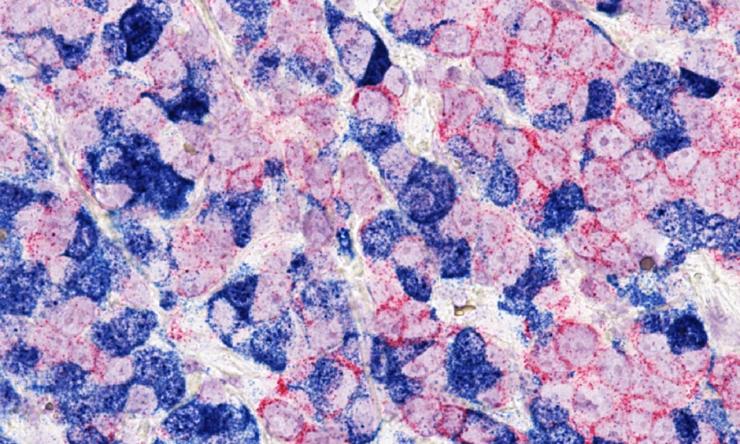Examining resistance to breast cancer treatments
The combination of CDK4/6 inhibitors with endocrine therapy is the standard of care for patients with estrogen receptor-positive (ER+) and HER2-negative (ER+/HER2-) metastatic breast cancer. However, a subset of patients will have tumors with intrinsic resistance to this therapy and most patients will develop resistant disease at some point during treatment.
Researchers at the Lester and Sue Smith Breast Center and the Dan L Duncan Comprehensive Cancer Center at Baylor College of Medicine examined gene expression data from preclinical models of ER+ breast cancer and from patients with early ER+/HER2- breast cancer who were participating in neoadjuvant trials of CDK4/6 inhibitors and found an association between high interferon (IFN) signaling and resistance to the treatment. The findings published in Clinical Cancer Research, a journal of the American Association for Cancer Research, may aid in helping doctors identify which patients would benefit more from CDK4/6 inhibitor treatment.
“CDK4/6 inhibitors are the standard of care for metastatic disease, and current clinical studies are investigating the use of this treatment in combination with endocrine therapy in early ER+ breast cancer, including in the neoadjuvant and adjuvant settings. It is therefore important to understand the molecular biomarkers of sensitivity and resistance to this therapy,” said Dr. Rachel Schiff, corresponding author of the study and professor at the Lester and Sue Smith Breast Center at Baylor.
The researchers investigated the association between the transcriptomic profiles of ER+ breast cancer cell models and their response to palbociclib, a CDK4/6 inhibitor. They observed an association between high interferon (IFN) signaling and reduced sensitivity to CDK4/6 inhibition. From this data, they developed an IFN-related palbociclib-resistance signature (IRPS) comprised of a subset of 35 genes related to IFN signaling.
The team then analyzed tumor samples from patients enrolled in two neoadjuvant trials of CDK4/6 inhibitor therapy (palbociclib or abemaciclib) and found the IFN-related and IRPS signatures to be highly enriched in patients whose tumors were intrinsically resistant to the therapy. They also found that the IRPS score was significantly higher in clinical ER+ tumors of the luminal B subtype, the more aggressive subtype with poor prognosis, than in the luminal A subtype. But, independent of the subtype, compared to tumors with low IRPS scores, higher IRPS score correlated with increased expression of immune checkpoint genes and immuno-suppressive tumor microenvironment, endocrine resistance and poor prognosis.
“This signature that we defined could be a predictive biomarker and help categorize ER+ breast cancer’s clinical response to anti-CDK4/6 therapy,” said Dr. Xiaoyong Fu, co-first author of the study and assistant professor at the Lester and Sue Smith Breast Center.
When examining breast cancer cell models with acquired resistance to CDK4/6 inhibitors, the team observed a major increase in IFN signaling at time resistance to CDK4/6 inhibitors. The IFN signaling levels in acquired resistance cells were significantly higher than in cells that were untreated or had only short-term treatment with CDK4/6 inhibitors. Further studies will be required to determine the role of IFN signaling in developing resistance.
“Measuring IFN signaling could be important in identifying who is less likely to respond to CDK4/6 inhibitors so they can be directed to other therapies,” said Dr. Carmine De Angelis, co-first author of the study, currently an oncologist at the University of Naples Federico II and at the time of this study, a postdoctoral fellow at the Lester and Sue Smith Breast Center.
“Targeting these agents to the right patients and learning how to mitigate or overcome resistance is important. These results shed light on a potential important mechanism of resistance that we also observed on correlative studies on samples from the PALLET trial that we collaborated on with NSABP and the Royal Marsden,” said Dr. Mothaffar Rimawi, study co-author and professor and executive medical director at the Dan L Duncan Comprehensive Cancer Center.
For a full list of contributing authors and financial support, see the publication.







 Credit
Credit


